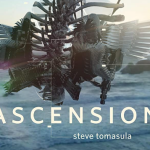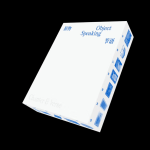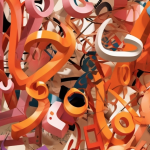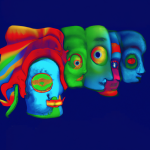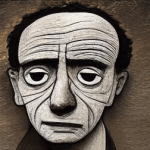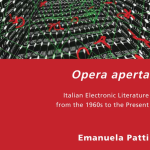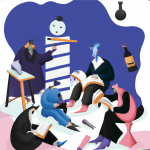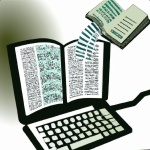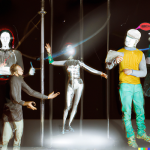Response to John Cayley’s ‘Modelit’
Stephen DoughertyIn his response to John Cayley, Dougherty takes the current concern with AIwriting as an opportunity to revive one of ebr's long-running threads; namely: the critical, contrarian riPOSTe.
Textpocalypse Now?
Søren Bro PoldPold extends Heckman's "thrilling (if not chilling)" critique to left-wing understandings and critical takes by theorists such as Walter Ong, Bernard Stiegler, and Vannevar Bush.
Erroneous Assumptions: Steve Tomasula’s Ascension
Stuart MoulthropTaking an ironic, Icarian twist on Steve Tomasula's Ascension, Stuart Moulthrop situates Tomasula's novel in a subterranean, encyclopedic lineage that includes print fictions like Joyce’s Ulysses, Dos Passos’ U.S.A. trilogy, Pynchon’s Gravity’s Rainbow, DeLillo’s Underworld, David Foster Wallace’s Infinite Jest, and Zadie Smith’s White Teeth – novels that are, as Edward Mendelson put it, “the products of an epoch in which the world's knowledge is larger than any one person can encompass.” It's an experimental lineage that is, arguably, one of the more noteworthy carryovers from print to digital literature; a genre that Moulthrop (2013) and his near contemporary Michael Joyce (2007) have termed the “novel of internet.”
On Digital Aesthetics: Sense-Data and Atmospheric Language
Mujie LiThis article examines how the formation of data can be seen as an aesthetic way of making sense. Following work in digital aesthetics, the article proposes to understand digital artifacts and processes via formalization and operation of media language. Li traces this idea through several examples from recent literature, film, games, and artwork in South-East Asia. Together with these examples, Deleuze’s philosophical thoughts on a genesis of sense production are re-considered in order to understand a formal way of making sense in producing the new. The notion of “abstraction” from ancient Chinese mathematical thought offers a re-consideration of Deleuze’s “intensive virtual”, that is, the way the formal, the operative and abstraction determine the extensive intensive. Sense-Data and atmospheric language address computation’s materiality in engendering the formal and the operative modalities of media language, as a way of producing states of being and becoming in cultural activities in which the digital is an agency.
Thoughts on the Textpocalypse
Davin HeckmanDavin Heckman offers thoughts on Matthew Kirschenbaum's now well-known essay in The Atlantic, The Textpocalypse (2023). Contemplating our own limits in digital media scholarship, including the reinforcing of technological determinisms, Heckman discusses the concept of transindividuation and its relationship with technology, or, the process of becoming an individual through participation in culture and society.
A review of My Life as an Artificial Creative Intelligence (2022)
David Thomas Henry WrightIn his review of Mark Amerika's My Life as an Artificial Creative Intelligence (2022), David Thomas Henry Wright highlights Amerika's negotiation of human, nonhuman, symbiotic creative practices in comparison with more traditional (including traditionally experimental) forms of writing.
Scott Rettberg Netprov Interview Oct 2022
Scott Rettberg, Rob WittigRob Wittig and Scott Rettberg discuss the pioneer times in digital writing and electronic literature, a time long ago, in a Galaxy far away, when the audience at literary events did not have a clue about hypertext and links.
Alex Mitchell Netprov Interview Nov 2022
Alex Mitchell, Rob WittigRob Wittig and Alex Mitchell discuss the very beginnings and the most recent iterations of Netprov, with a focus on generative AI, collaboration and improvisational writing.
‘A Shifting Surface World’: The Techno-Graphomania of David Jhave Johnston’s ReRites
George MacBethAvoiding the "twin pitfalls of either Luddite dread or AI boosterism," in this essay George MacBeth offers a close Re-Reading of Jhave's ReRites.
My Month with Midjourney
Ian DemskyIn this republished Medium essay, Ian Demsky takes a personal and playful dive into AI image generation.
Open, but not too much. A review of Emanuela Patti’s Opera aperta. Italian Electronic Literature from the 1960s to the Present
Roberta IadevaiaStarting with Umberto Eco's 1962 essay, "Opera aperta," and progressing into Emanuela Patti's tentative forays into Italian Electronic Literature from the 1960s to the Present, Roberta Iadevaia nicely locates a trajectory for Italian e-Lit, albeit one that is still open, "in contention," without any "encyclopedic guarantee, and no single world order on which our imaginative projections can rest."
Johannah Rodgers Netprov Interview, Oct 2022
Rob Wittig, Johannah RodgersRob Wittig and Johannah Rodgers – an independent scholar and a digital writer – discuss the collaborative and community-building nature of Netprov.
Image: DALL·E 2023-03-02 19.55.13 - "a group of people writing collectively a novel on financial crisis."
J †Johnson Netprov Interview, Oct 2022
J †Johnson, Rob WittigRob Wittig and JT Johnson – a digital artist and writer – chat on the beginnings of Netprov, design of fictional worlds, and talent shows.
Image: DALL·E 2023-03-02 20.01.05 - "electronic literature can only exist up to a certain point, and then it dissolves itself as it becomes a discipline."
Claire Donato Netprov Interview, Dec 2022
Rob Wittig, Claire DonatoRob Wittig and Claire Donato - a writer, a multidisciplinary artist, and a netprov contributor – discuss how a sense of performativity linked with playfulness and joy of collaborative improvisation constitute the very core of netprov.
Image: DALL-E, at a prompt: “A futuristic image of a group of people and AI improvising a theater play”.
‘More of a performer than a listener’: Reading Hazel Smith’s Ecliptical
Joy WallaceIn this substantial and original analysis (which is more a review essay than a simple review) Joy Wallace further extends a series of five reflective pieces on the renowned Australian poet, performer, and multimedia writer, Hazel Smith.


